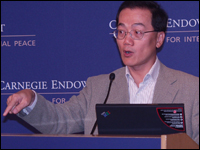Registration
You will receive an email confirming your registration.
IMGXYZ924IMGZYXChina is shifting its focus from growth at all costs to the broader goal of economic development, which in addition to growth includes a wide range of social and economic policy objectives. To examine the nature and impact of that transition, Carnegie hosted an event with KC Kwok, chief government economist of China's Hong Kong Special Administrative Region. Albert Keidel, senior associate at Carnegie, moderated the discussion.
Slowing Growth
Although China's growth has accelerated for the past five years, it now appears to be slowing as the contribution of net exports weakens. The Olympics had a substantial impact on Beijing's economy, but a negligible impact on the Chinese economy as a whole, so China will not experience a post-Olympics slump. However, many of the factors that have underpinned expansion since the 1970s have run their course: inexpensive labor, FDI inflows, and investment-led industrial expansion.
At the same time, just as traditional factors behind earlier success are running their course, a host of imbalances now also confronts China's economic growth: worsening disparities (between urban and rural households, between east and west, and between haves and have-nots), the gap between investment and consumption, and worsening pollution.
The Chinese government welcomes a slowdown as long as China can still maintain something like nine-percent growth. Achieving this goal will be challenging as exports slow, because growth of net exports contributed roughly two and a half percentage points to 2007 GDP growth. Nevertheless, both domestic consumer spending and investment continue to expand rapidly, and the government also hopes that somewhat slower growth can gradually help control inflation.
A New Paradigm
These challenges have compelled the Chinese government to shift its focus from narrow growth targets to broader development objectives. The former emphasis on low-cost competitive advantages, industrial expansion, and economic growth as an end in itself has given way to an emphasis on quality production, improved innovative capacity, services, and sustainable growth. The government has, accordingly, prioritized several goals, including further administrative reform, fiscal reform, financial market reform, the growth of the private sector, and the development of a social security apparatus.
Looking Forward
Kwok emphasized several related priorities, especially support for the private sector. Expanding the private sector is critical to improving efficiency, boosting private investment, and increasing consumption of services. State-owned enterprises still dominate many sectors, and further reforms will weaken links to the government. For fiscal reforms, even though government revenue accounts for a growing share of GDP, major reforms to the value added tax are likely. Regionally, he noted that Beijing is looking to revitalize northeast China and the Taiwan strait region.
Kwok highlighted cooperation between Guangdong Province and Hong Kong as an early example of how China seeks to become more service-sector-oriented.
The discussion period addressed a number of topics, including the implications of China's new outlook for the American economy, the likelihood of widespread social unrest as the government continues with economic reforms, potential growth obstacles, the changing availability and nature of social services, and Guangdong’s environmental impact on Hong Kong.
